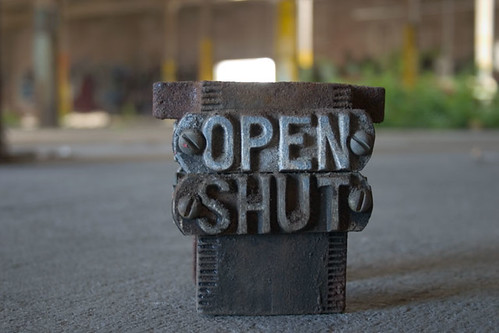Globalization, a Flat World, and Falling Roofs
 Show on map
Show on map
By Jonathan H

What is depicted in the above image no longer exists. What little I saw of it, when it existed, was in shambles. Pieces of cardboard and stripped copper wiring were strewn across the floor. Scrawls intersected with airbrushed art. Light ended on concrete. Colors converged.
It was a beautiful place for what it was. A post-industrial escape. A progressive-era Muir cathedral that was literally five minutes away from me. Despite the fact that it resided in the center of the homicide capitol of the west, it was my respite.
And it no longer exists.
Appropriately, PABCO roofing and manufacturing in Richmond, California is losing its last few bricks as I complete The World is Flat. Though I don’t necessarily subscribe to Friedman’s radically liberal (in an economic sense) tendencies, I believe the central premise of his thesis is correct. We are losing our manufacturing base. The time has come for us to choose between “open” and “shut.” My suggestion? Let’s pick open.

It may be fine and dandy when what we lose is an antiquated brick structure that made easily producible tar roof shingles — but it will be another matter entirely when we lose in the battle over minds, R&D, and high-tech production. There are countries that are already a sprint ahead of us in the energy realm. For starters, look into the host country for ITER and the sugar ethanol strides made by Brazil; also consider the efforts using offshore wind in Denmark.
Energy is just one example. For Egypt, the Ramadan tradition of fawanis is another, and Friedman tells us why:
“For centuries, small, low-wage workshops in Cairo’s older neighborhoods have manufactured these lanterns ? until the last few years. That was when plastic Chinese-made Ramadan lanterns, each with a battery-powered light instead of a candle, began flooding the market, crippling the traditional Egyptian workshops.”
Why the Globalization Hate?
To the untrained, careless peruser, the title of this entry may seemingly point an accusatory finger at globalization. That couldn’t be further from the truth. My own belief is that the world benefits from globalization, and I wish everyone would accept it. The requisite political stability and economic prosperity will soon follow. Getting there — though — means we have to replace the hard work of manufacturing roofing shingles (as we did in the factory above), with the even more ambitious task of competing globally in technology.
All of this requires a New Manhattan project, and a new program akin to the space race (more on this later). Thankfully one presidential candidate has laid out a clear plan for this. How we will get there is also up to us, but one sure route is by changing our culture, attitudes, openness to change, and adaptability in a “flat world,” as Friedman would call it. In order to do this, we’ll need to pull up our boot straps, roll up our sleeves, and start mucking.

 Reddit!
Reddit! Del.icio.us
Del.icio.us Digg
Digg StumbleUpon
StumbleUpon Technorati
Technorati Blinklist
Blinklist Furl
Furl
Globalization using free trade as its tool has failed. We have more than a thirty years of failures now. President Obama bailed out the investment communities and other entities that backed the project. In essence, he put tariffs on future generations to come to save the day but is can not be lasting because nothing really has changed as we wait for the next economic bubble to burst. It comes down to this. Investments have been divorced from production. Workers are now commodities. They are put on a world trading block to compete with one another for the same jobs. It is race to the bottom since there is an inventory of more than a billion people in the world who are willing to work for practically nothing in order to survive. These workers do not make enough to buy the things they make let alone support the process by being consumers. In the end, you can not do business with people who do not have money. Search under tapsearch globalization or Ray Tapajna Living Journals for thousands of resources and references on this subject.